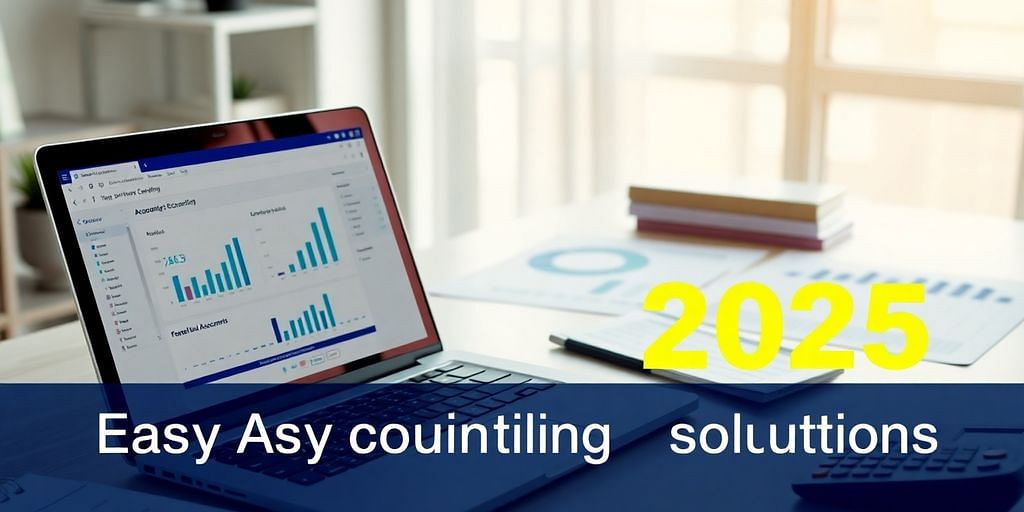
Discover the Best and Easy Accounting Software for 2025: Simplify Your Financial Management
Back To BlogWhy Accounting Software is a Game-Changer

Automate Tedious Tasks
Let's be real, nobody kicks off a business because they're thrilled about crunching numbers. That's where accounting software steps in. It takes the grunt work out of managing finances by automating repetitive tasks like data entry, transaction tracking, and report generation. Instead of spending hours sifting through receipts, you can focus on what really matters—growing your business. Plus, with automation, you reduce the risk of human error, keeping your books tidy and accurate.
Stay on Top of Your Finances
Keeping your financial health in check is crucial for any small business. With accounting software, you get real-time insights into your cash flow, expenses, and profits. This means you're not just reacting to financial hiccups but proactively managing them. You can set budgets, track expenses, and even forecast future financial trends. It's like having a financial advisor on your team, minus the hefty fees.
Avoid Tax Season Headaches
Tax season can be a nightmare without the right tools. But with accounting software, you can breathe a little easier. It organizes your financial data throughout the year, making tax time a breeze. You’ll have all the necessary documents and reports at your fingertips, ensuring compliance and potentially saving you money on penalties. It's peace of mind knowing you're prepared when Uncle Sam comes knocking.
Using accounting software isn't just about making life easier; it's about making smarter financial decisions. When you can see the big picture, you're better equipped to steer your business in the right direction. Whether it's automating mundane tasks or staying ahead of taxes, the right software is a game-changer for small businesses.
Top Features to Look for in Accounting Tools
Picking the right accounting software is like choosing the perfect pair of shoes. It needs to fit just right and support you through every step. Let's talk about some must-have features that'll make managing your finances a breeze.
Invoicing and Billing Made Easy
Creating invoices shouldn't feel like pulling teeth. We want software that can handle everything from crafting a professional-looking invoice to tracking payments. Having a tool that lets us customize invoices with our logo and terms is essential. Plus, the ability to turn estimates into invoices and accept online payments is a game-changer for service-based businesses.
Automating invoicing not only saves time but also ensures you get paid faster. Imagine having all your billing tasks handled with just a few clicks.
Expense Tracking on the Go
Keeping track of expenses can be a real headache, especially when we're always on the move. Look for software that allows us to snap photos of receipts and log expenses automatically. This way, we can keep tabs on where our money is going without having to sift through piles of paper. Expense tracking should be seamless, so we spend less time worrying about where our money went and more time focusing on growing our business.
- Snap photos of receipts for easy logging.
- Categorize expenses automatically.
- Generate expense reports with one click.
Seamless Integration with Other Apps
Our accounting software should play well with others. It's crucial that it integrates with the tools we already use, like payment processors or CRM systems. This integration minimizes manual data entry and ensures that all our systems are in sync. Whether it's connecting with our point-of-sale software or payroll tools, having everything work together smoothly saves us time and reduces errors.
Picking the right software isn't just about finding something that works today; it's about choosing a tool that can grow with us. Whether we're freelancers or running a small business, the right software can be a game-changer.
By focusing on these features, we're setting ourselves up for success. As our business evolves, we'll have the tools we need to keep up with the demands and challenges that come our way.
Choosing the Right Software for Your Business
Consider Your Business Size and Needs
When picking accounting software, the size of your business and its specific needs should be your first consideration. Are you running a small startup or managing a bustling enterprise? For a small business, you might need basic invoicing and expense tracking. But if you're a larger company, you might require more advanced features like inventory management and payroll. Understanding your business's unique requirements will help you narrow down your options.
Evaluate User-Friendliness and Support
No one wants to spend hours figuring out how to use new software. Look for tools that are intuitive and easy to navigate. Test out demos or trial versions to get a feel for how the software works. Good customer support is a lifesaver, especially when you're new to the game. Make sure there's a reliable support team available to help you out when things get tricky.
Look for Scalability and Integration
Your business is likely to grow, and so should your accounting software. Pick a solution that can scale with you, offering more features as your needs expand. Integration is equally important. Ensure the software can connect with other tools you use, like CRM or e-commerce platforms, so everything works smoothly together.
Choosing the right accounting software is like finding a partner for your business—one that grows with you and adapts to new challenges. Take your time, weigh your options, and choose wisely.
Our Favorite Accounting Tools for 2025

Choosing the right accounting software can feel like hunting for the perfect pair of sneakers. They need to fit just right, support you through every step, and make your life easier. In 2025, we've got some standout picks that are sure to help you manage your finances with ease.
QuickBooks Online: The All-Rounder
QuickBooks Online is like the Swiss Army knife of accounting tools. It's packed with features that cater to various business needs. From tracking expenses and handling invoices to managing payroll, it does it all. It even offers a mobile app for those who are always on the go.
- Expense Management: Snap photos of receipts, log expenses automatically, and keep tabs on where your money is going.
- Invoicing Made Simple: Create and send invoices directly from the app with just a few clicks.
- Integration Galore: Connects seamlessly with other apps like payment processors and CRM systems.
QuickBooks is not just a tool; it's a partner in managing your business finances.
Xero: The User-Friendly Alternative
Xero is a breath of fresh air for those who find accounting a bit daunting. Its clean interface and straightforward features make it a joy to use.
- Easy Setup: Get up and running in no time with its intuitive setup process.
- Real-Time Collaboration: Work with your accountant or team in real-time, no matter where you are.
- Mobile Access: Manage your finances on the go with Xero's robust mobile app.
FreshBooks: Best for Service-Based Businesses
If you're in a service-based business, FreshBooks might just be your new best friend. It's designed with freelancers and service providers in mind.
- Time Tracking: Keep track of billable hours with ease.
- Client Management: Organize your client information and communications all in one place.
- Project Management: Manage projects and collaborate with your team effortlessly.
In 2024, accountants can enhance their workflow with essential software like QuickBooks, Xero, and Sage Intacct. These tools streamline financial management through user-friendly interfaces, automation, and robust reporting capabilities. QuickBooks excels in client management, Xero simplifies invoicing and offers mobile access, while Sage Intacct provides advanced features for larger firms. Additionally, workflow management tools like TaxDome help organize tasks and improve communication, allowing accountants to focus on delivering excellent client service.
Frequently Asked Questions
What makes accounting software essential for small businesses?
Accounting software is crucial as it automates repetitive tasks, keeps track of expenses, and helps manage finances efficiently. It allows small business owners to focus on growth rather than paperwork.
How do I choose the right accounting software for my business?
To pick the right accounting software, consider your business size, needs, and budget. Look for user-friendly features, good customer support, and the ability to grow with your business.
Can accounting software help with tax preparation?
Yes, accounting software can simplify tax preparation by organizing financial data throughout the year. It ensures you have all necessary documents ready for tax season, reducing stress and potential errors.
